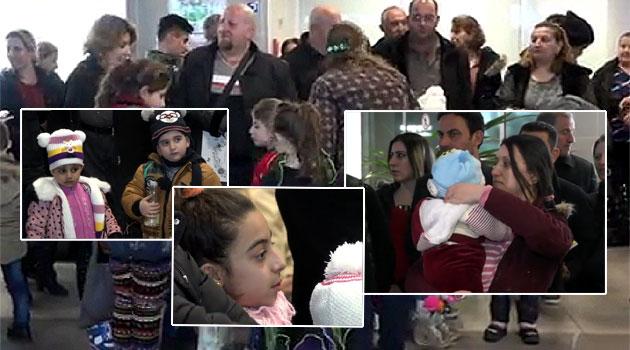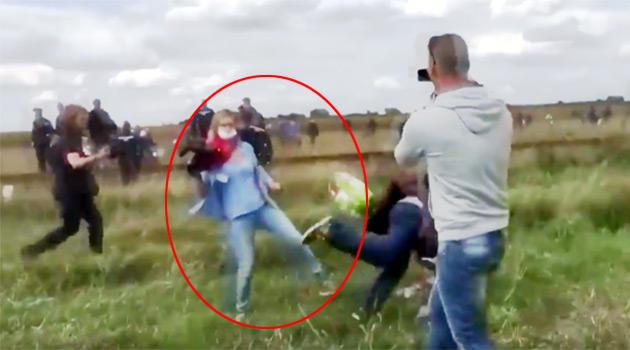Central and East European NGOs critique EU Member States barring asylum-seekers

Some EU Member States in Central and Eastern Europe are making it difficult for persons fleeing war to seek asylum on their territories. They have complicated the asylum-seekers’ access to protection by increasing border checks, erecting physical barriers on their borders and undertaking various police procedures to deter them.
Those are the findings of a report entitled “Pushed Back at the Door” describing the access of asylum-seekers to protection in Bulgaria, the Czech Republic, Hungary, Poland and Slovenia. Representatives of nonprofits from several EU Member States presented the report at a press conference in Prague last week.
The Aliens Police of the Czech Republic has objected to the allegations that it has either impaired or thwarted foreign nationals’ efforts to request asylum in the Czech Republic. The police have called the assertions “absurd”.
The report was authored by the Bulgarian Helsinki Committee, the Czech Republic’s Organization for Aid to Refugees (OPU), the Hungarian Helsinki Committee, Poland’s Helsinki Foundation for Human Rights and the Legal Information Centre for NGOs in Slovenia. All of the organizations are part of an umbrella organization, the European Council on Refugees and Exiles (ECRE).
“We are seeing similar problems in how refugees are being dealt with along the Balkan route and in the countries of Central Europe. These particular states do not want people passing through or settling, and they are also rejecting proposals for redistribution of asylum-seekers among the EU Member States. Their excuse is that these people do not want to remain on their territories in any event,” said Martin Rozumek, the head of OPU.
According to Rozumek, some countries are referring to international law in order to return asylum-seekers from their territories to other EU Member States. According to international rules, asylum-seekers are meant to apply in the first EU Member State they enter.
The Czech Republic is returning detained foreign nationals who do not have proper identification to the neighboring EU Member States from which they crossed into the country and is considering its own external border to exist at the airport only. According to the NGO representatives, it is not unusual for asylum-seekers to be “forcibly expelled” from some countries’ territories, while in other places police just do not facilitate applications for asylum.
Kateřina Rendlová, a spokesperson for the Aliens’ Police, said it is lawful for police to deny entry to the country. Last year police used such means in the cases of 369 persons with forged identity papers, without visas or other permission to stay, who were not seeking asylum.
Most frequently such persons were from Azerbaijan, Georgia, Iraq or Russia, the spokesperson said. “It is absolutely absurd to allege that the Aliens Police have made it difficult in any way – or even that they have managed to thwart – attempts by foreign nationals to seek asylum in the Czech Republic,” she said.
Rendlová said she believes foreign nationals do not apply for asylum in the Czech Republic because then they would not have the opportunity to seek protection in another EU Member State they find more attractive. Allegedly such persons prefer to return to their home countries and then attempt to re-enter the EU by another route.
Staffers with OPU have followed the situation at Prague airport, where a reception center for asylum-seekers is located. “The barriers we saw involved two scenarios. The first concerns people who arrive by plane without valid documents, the other involves those whose passports and visas are in order,” an OPU staffer said.
She went on to describe the case of a youth from Sri Lanka. Even though he repeated the word “refugee”, in English, when he was being checked at the border, because he had no proper documents he ended up in a detention cell – and then had to return to his home country despite the fact that he had been tortured there.
The OPU staffer mentioned another case of a Yazidi couple with four children. The family arrived with valid visas issued in Irbil, the capital of Iraqi Kurdistan.
The family was detained nonetheless. The staff at the reception center wanted to return them to their home country.
Anikó Bakonyi of the Hungarian Helsinki Committee said that not allowing asylum-seekers into Hugnary and not facilitating their asylum applications is the customary approach there. “We chose the title of this report, Pushed Back at the Door, because it is a good metaphor,” she said.
Bakonyi added that fences on the borders were not deterring asylum-seekers from entering the country, just increasing the danger they face while doing so. The NGOs are asking that countries introduce monitoring of the border control processes.
European civil society wants to know how police procedures with asylum-seekers are unfolding. The NGOs emphasized that human rights must be upheld even during increased border surveillance.
According to Eurostat data, the Czech Republic is one of the EU Member States where foreign nationals seek asylum the least. While elsewhere in the EU-28 an average of 702 people per one million inhabitants file their first-ever applications for international protection, the amount of such applications in the Czech Republic is 25 times smaller – during the third quarter of 2016 there were 28 asylum applicants per one million people in the Czech Republic.
